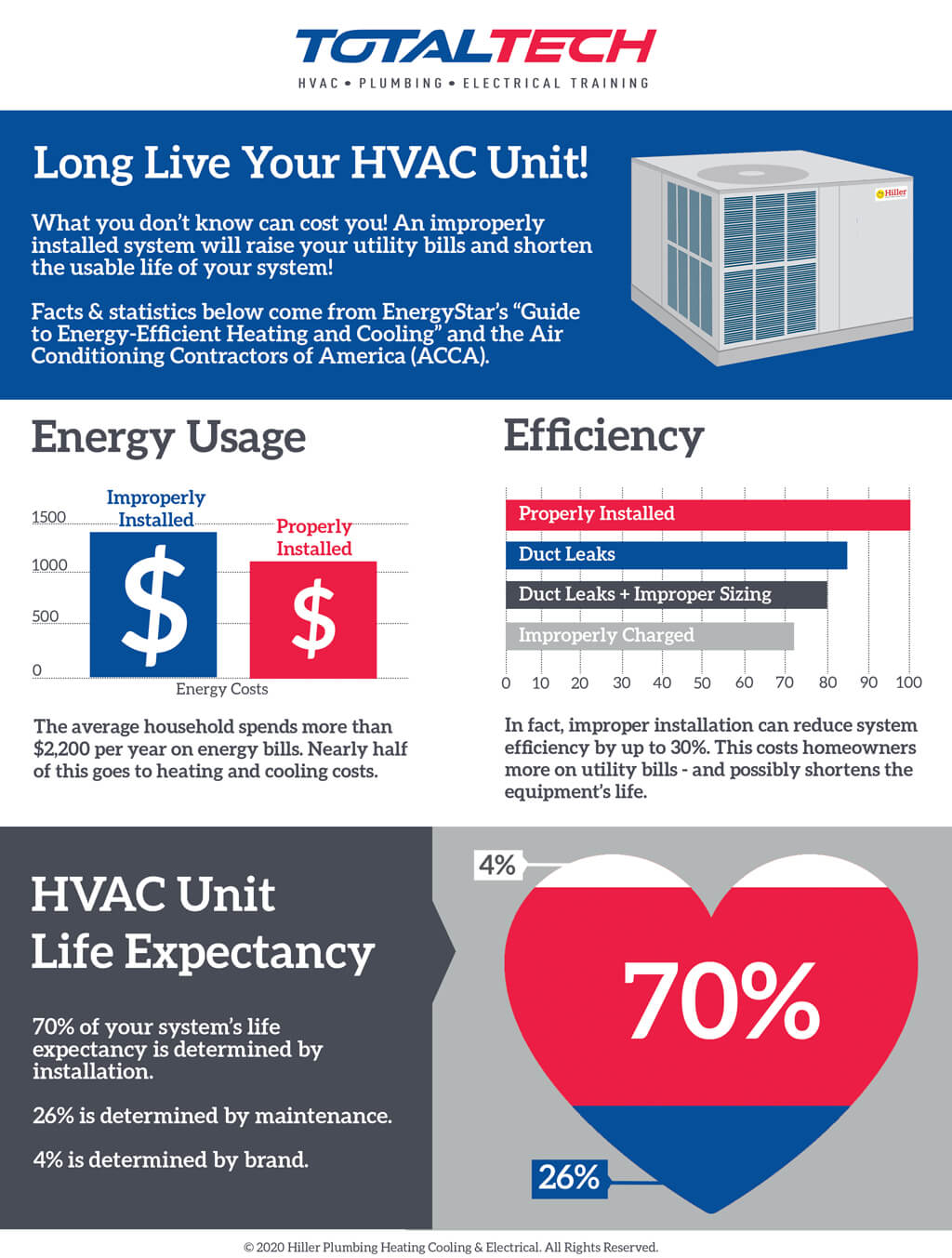How Much Does an HVAC System Cost?
Enjoy reading the latest DIY articles and saving money?
Receive our latest helpful hints, tricks and savings, directly to your inbox.
Posted February 14, 2020
Nearly 100 million homes across America have air conditioning units installed and the use of HVAC systems continues to rise. From 2017 to 2018, engineers around the country installed a further 20,000 units. These units are perfect for creating a comfortable home. They’ll keep you warm in the winter and cool in summer. And an efficient HVAC system could save you hundreds of dollars in energy bills. But an inefficient system could cost you dearly. This is why it’s important to keep your HVAC system in check and replace it if needs be. Want to know more about the average HVAC system cost of replacement? Then you’re in the right place!
Read on to find out everything you need to know about the cost of HVAC repair services.
When Should You Get an HVAC Replacement?
Keeping on top of your HVAC maintenance checklist will help you to get the most out of your system, but in some cases, getting a replacement is necessary.
Most AC units last for around ten years, but you could make this stretch for fifteen years with good maintenance. After fifteen years, you’ll need to replace your AC and your furnace as they will no longer run efficiently.
Often your HVAC system will let you know when something is wrong. Listening out for any changes in your current HVAC sounds can tell you if something is wrong with your system. Check out these other signs your HVAC system needs replacing for help understanding what’s happening in your home.
You may choose to upgrade your HVAC before this for a more energy-efficient model. This market is growing all the time, and manufacturers are making leaps and bounds in energy-efficient units. You could save money on gas bills in the long run by upgrading before your fifteen-years are up.
HVAC system costs can be high, so it’s important to think about when you want to time yours. If you have some spare cash flow, it might be a good time to upgrade your system. Or you might want to plan it in advance so you can start saving up.
But just how much does an HVAC system cost?
What is the Average HVAC Cost of Replacement?
The average cost of an HVAC replacement can vary depending on what type of replacement you go for. But they don’t come cheap.
To get a basic system installed, you’re looking between $5,000 and $8,000. More complex systems could set you back between $7,500 and $11,500. For the most high-end system around, you’ll probably have to pay somewhere between $10,000 and $15,750.
These prices might sound like a lot but they do include the cost of installation as well as the units themselves. And when you think about how regularly you’ll use your HVAC system the price seems more reasonable.
There are a lot of other factors that can affect how much your HVAC repair will cost. Let’s take a look at some of them.

More Efficient HVAC Systems Cost More to Replace
If a unit is more efficient, then it will take longer to install and this will cost more.
You can check your AC’s efficiency rating by looking at its SEER (Seasonal Energy Efficiency Ratio) This ranks your unit’s efficiency from 13 to 21+ with 21+ being the most efficient.
The AFUE (Annual Fuel Utilization Efficiency) will tell you how efficient your furnace is. This uses a percentage between 80% and 100%, with 100% being the most efficient.
A higher number for both units will mean they cost more to replace, but a higher efficiency rating means lower energy bills. It might be worth the extra cash in the long run if you have it.
Whatever rating you go for, both of your units must be similarly efficient as they have to work together. It’s no good opting for an efficient AC unit if your furnace can’t keep up with it.
An HVAC Replacement Cost Will be Higher for a Bigger Unit
When it comes to HVAC systems, size matters and a bigger unit means a bigger bill.
You can measure the size of your AC unit using “tonnage”, which tells you how much the unit can cool over one hour. Most domestic systems will be between one and five-ton units. You can also get half-sizes between units, such as 3.5 tons.
The BTU (British Thermal Unit) output determines the size of your furnace. This looks at how much heating your furnace can provide in a given period of time.
A single BTU provides the same amount of heat as a single lit match. As you can imagine most furnaces provide a lot more heat than this! The average domestic furnace generates between 35,000 and 100,000 BTUs.
Installing a big unit is a bigger task, which is why it costs more. It is always worth discussing the right size system for your home with an expert HVAC service.
A basic provider will only base your unit size on your home’s size in square feet, but you need a more thorough consultation to decide the right size for you.
Choosing the wrong sized HVAC system could mean you end up paying much more than you need to on your energy bills. It could also mean your units don’t last as long as they should, or you might have to fork out loads of money on repairs to keep them running.
Additional Features Will Cost Extra
There have been huge advancements in the technology that you can get alongside your HVAC system. This is great, as it allows you to customize your units to suit your needs. This does come at an extra cost.
For example, you might want to get a system featuring variable-speed technology. This allows the system’s blower motor and air-conditioning compressor to automatically adjust. This saves you a job and means that you are always comfortable.
But this continuous adjustment could also save you in energy bills. It means that if you’re out at work, your home’s heating or cooling will sort itself out so you don’t waste energy for a second.
You might also consider investing in noise reduction technology for your system. This is fairly self-explanatory – it means you won’t be bothered by the noise of your system running. There are several different types of noise reduction tools that you can install alongside your unit including:
- Noise dampening strips
- Noise-reducing blades for your system’s fans
- An insulating cabinet for your furnace
- Compressor insulation or mounts
An expert will install these alongside your HVAC system. You could also get them installed at a later date but you’ll often save money if you do it all at one time.
Finally, in 2017 there were over 45 million smart homes across Europe and North America, so it’s only right that HVAC can offer its own smart solution. Installing a smart thermostat gives you control of your home’s temperature wherever you are. Some devices even collect data on your home’s activities and adjust the temperature according to that.
This is another great way to shave some money off your energy bills and it means you never have to worry about leaving the heating on again!
Your Home’s Climate
Your home itself can play a big role in the cost of an HVAC replacement.
As we’ve already mentioned, the size of your home may affect the size of the unit you need, which will affect how much you pay for your replacement. But the climate where you live can also play a big part. This is because your home’s climate will dictate how efficient you need your unit to be.
For example, if you live in a very cold climate then you will need to use your heating a lot. This means you want to invest in an extremely efficient furnace. This will cost more to install but save you money in the long run.
Similarly, in a hot climate, you want an efficient AC unit. And if you experience very cold winters but boiling summers then you’ll need the best of both.
It’s also worth remembering here that you need the efficiency of both units to be similar. If you have one very efficient unit and one less efficient one then it will slow down the more efficient one. So opting for a great heater and a poor AC unit could mess up your whole system.
Each Contractor Sets Their Own Price
Finally, the person you hire to install your HVAC unit will also affect how much you pay.
As you’ve probably realized by now, the cost of installation can be huge but it is an important part of ensuring your system runs properly. In fact, if you don’t install your system properly then this can reduce its efficiency by up to 30%, so you don’t want to cut corners here.

Often hiring an experienced, high-quality contractor will cost a lot more but you should think of this as an investment. If someone comes in and does a poor job, you may end up having to get the work done again. You may even lose money on a system that doesn’t run efficiently.
Checking out reviews of a contractor is a great way to find out about other customers’ experiences. Look on sites like Google or Facebook to read unbiased reviews rather than only reading the ones on their website.
You can also ask a company to provide referrals from previous clients. Any reputable company will have these ready for you and should provide contact details so you can check that they’re legitimate.
You also want to go to a company that has experience in the area. Look for a business that has been around for several years rather than opting for a new startup. And make sure they have specific experience in HVAC installation.
Finally, only ever hire a licensed company that has its own insurance. A company that offers a guarantee is also a good one to look out for. This shows that they’re committed to getting the job done right.
The Bottom Line
There’s no shortcut to finding the average cost of a furnace and air conditioner replacement. This price will vary from home to home but one thing is for certain, they don’t come cheap!
Nevertheless, think of your HVAC replacement as an investment. Going for a high-quality unit and using a reputable company to install it means you’ll have a system that will last for years to come.
Before you start Googling ‘HVAC repair near me’, check out our top tips on picking the best technician for the job. Or get in touch today to speak to an expert about your home’s heating. We’re here to help!
 Daily Promotion
Daily Promotion
$500 Off Tankless Water Heater
Upgrade your comfort and give back this season.
Get Promotion